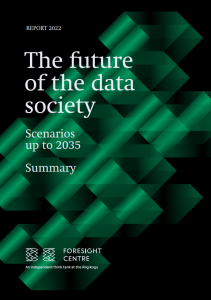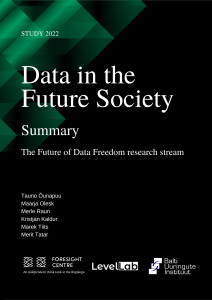The Future of Data Freedom

Data are a resource of rapidly increasing importance in the economy and society. This research stream considers the central development trends and choices for the Estonian data economy and for the future progress of data-informed public governance, and their economic and social consequences up to 2035. The future of data management is considered from the perspectives of the data subject, the data holder, and the possible data user. The focus is on the collection, exchange and use of data both within and between the public and private sectors.
Technological development has made society and the economy more data-centric. Almost everything we do leaves a steadily growing data footprint. Data allow smarter political decisions to be made and better services to be provided more efficiently. Equally, a data-centric world is something quite new for us and best practices are still only in their infancy. There are legal, technological and management questions among others that need to be answered.
Estonia is a democratic state built on the rule of law that has transparency of social processes and general openness as its cornerstone. Open access to information and data is needed if the public authorities are to be held to account and people are to be more aware of what is happening in society and the country and of how they function.
Estonia is however part of the European cultural space, where there is a fundamental right to privacy and a private life. Academic studies find that extensive erosion of this right can lead to abuses of power and a surveillance society, a reduced sense of public security, the spread of manipulative business practices, and much more.
Ernst&Young (2021) identified various factors and trends that will affect data in the future, including:
- Changing preferences in the compromise between convenience and privacy. The trend has leant clearly in the past couple of years towards privacy, as people have become much more aware about data protection and privacy.
- The trend towards increasing surveillance, including data-based surveillance, over how people behave with the aim of monitoring, describing, preventing and guiding that behaviour.
- The trend towards increasing complexity in society through specialisation and increasing complexity of processes, even those that need to be understandable for the majority of the public. The digital gap between what people with different digital skills are able to do will widen.
- The sale or consent-based sharing of personal data. Although there is a general understanding of the value of data, and transactions to acquire data and information are a matter of everyday business for companies and other institutions, society has not advanced far with discussion of personal sales or voluntary sharing of personal data. Is it ethical to sell personal data? How can the sale or sharing of data be managed legally and technically, given that the data are mainly valuable to the user when there are large amounts of them?
The research stream looks to answer the following central research questions:
- What are the main directions and issues in data and the use of data in Estonia and the wider world? We look at the social, economic, legal, technological and political directions and issues. What are the weak signals and wild cards in data that indicate how the current trends may change or how new trends may arise?
- What are the different scenarios for the future for data management in Estonia and what does each scenario mean for citizens, businesses, the private sector and the state?
- What are the key future choices and steps for the Estonian state in data: making state data available, facilitating effective data exchange in the private sector, allowing cross-usage of data in the public sector, using private sector data for public administration, or developing data-informed public governance?
Reports linked to the research
News linked to the research
-
16.11 2022Foresight data conference: “How could data serve us better?”
How can we make the data collected by the public sector more useful for both the Estonian society and every individual is the question asked at the Foresight Centre data conference “How could data serve us better?”.

 An independent think tank at the Riigikogu
An independent think tank at the Riigikogu 




